The year is 2008. Maxidresses and gladiator sandals are the hottest look of the summer. Jeans are skinny. Britney Spears is making her comeback after recently shaving her head. And if you’re not drinking wine or beer, a night out in Toronto means sipping a vodka cran, a neon-hued martini or a classic cocktail.
“When I first opened BarChef [in 2008], there might have been one other cocktail bar,” says Frankie Solarik, owner of Toronto’s pioneering cocktail bar and recently opened sister spot Prequel & Co. Apothecary. “At the time, there was a pretty strong cocktail scene within restaurants in the city. They were just starting to put an emphasis on professionals being behind the bar and curating cocktail programs for restaurants. But as far as standalone cocktail bars — there weren’t any.”
Frankie Solarik, owner of BarChef and Prequel & Co. Apothecary, and a judge on Netflix’s Drink Masters
The Champagne & Absinthe cocktail at Prequel & Co. Apothecary
More than a decade ago, a unique, craft cocktail was hard to come by in Toronto. As a young adult who had yet to acquire a taste for beer or wine, I would always ask for a cocktail menu and bartenders would often scoff, “We don’t do that here.” Meanwhile, bar programs in restaurants leaned heavily on classics, with drinks like the cosmopolitan shooting to stardom thanks to Sex and the City.
“Mixologists were obsessed with classics. It was this thing where if you wanted to make cocktails, you had to replicate recipes from the 1900s and the 1800s. My whole approach was to respect those classics because of what they’ve contributed to the industry, but then at the same time, create my own voice and my own expression on the genre,” Solarik says. “The whole reason I do what I do artistically is for the industry to essentially think outside of the box and create their own voice.”
BarChef takes a gastronomic approach to their culinary cocktails, using fresh ingredients
BarChef shook Toronto to its core. There had never been — and still isn’t — another cocktail bar in Toronto with such a gastronomical approach.
“The idea was to really put an emphasis on the culinary cocktail and emphasizing fresh ingredients and hand-chipped ice components, and incorporating modern gastronomical techniques,” says Solarik. Imaginative, full of fresh ingredients and brimming with technique, his creations are inimitable. But Solarik wasn’t the only one making waves in Toronto’s cocktail scene in the early 2010s. A clutch of bartenders and mixologists were quietly shaking up the industry.
Frankie Solarik opened Prequel & Co. Apothecary in early 2023
“When I moved to Toronto in 2012, that was the first thing I was struck by — the amount of enthusiasm for the cocktail scene,” says David Greig, who has a hand in Jen Agg’s empire as the co-owner of Le Swan and Bar Vendetta and the beverage director of the aforementioned, along with Cocktail Bar and Rhum Corner. “The enthusiasm was there, but there were very little structures in place ... It was very much a niche pursuit for a small handful of bartenders around town.”
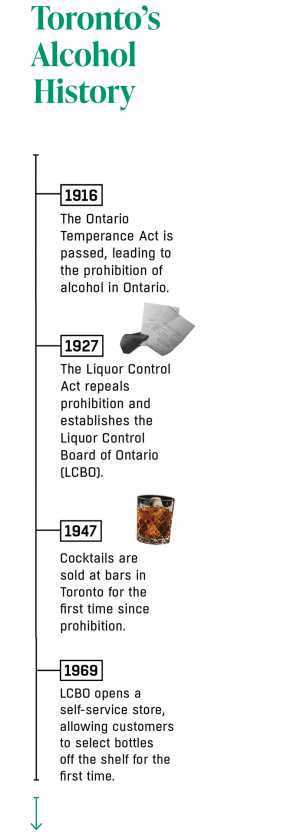
Greig had moved to Toronto from Vancouver, but is initially from London, U.K., which, “even in 2010 had a very well-established cocktail scene. At that point, London and New York were the epicentres of cocktail culture in the world,” he reflects. Meanwhile, Toronto was still tottering on its training wheels.
“The actual quality of the bars and the cocktail programs in restaurants hadn’t caught up with the enthusiasm and the ambition of a lot of people. There were a handful of places, absolutely. Cocktail Bar was doing fantastic stuff back then,” says Greig. “I think it would be remiss of me as well not to mention Sandy De Almeida. She was a bartender who really was one of the pioneers and the driving forces of the Toronto cocktail scene back when it was still developing. When I moved here, the first really great cocktail I had in Toronto was one of hers … There’s no history of the Toronto cocktail scene that can be written or talked about without mentioning her.”
Last year, De Almeida’s sudden passing was met with an outpouring of grief from Toronto’s bar community. Industry vets took to social media to sing her praises and express the impact she had on Toronto’s cocktail scene. During her more than two-decades-long career, De Almeida graced the likes of The Gladstone, Reposado, Churchill and The Drake.
Flying under the radar of Toronto’s mainstream drinking scene, bartenders like De Almeida were pushing the envelope and redefining the city’s cocktail culture.
“There were only a few bars that were doing really incredible craft cocktails,” says Evelyn Chick, beverage expert and owner of Simpl Things in Parkdale. “There was Harbord Room, where I was [the bar manager at the time]. There was Rush Lane that was doing some molecular stuff. I think the industry was quite into the scene, but it was definitely something that was just happening.” Chick had moved to Toronto from Vancouver in 2015, right “around the time when Canadian bartenders were starting to appear in global and national competitions,” she says.
Chick tries to keep prices down at Simpl Things by keeping things, well, simple
Evelyn Chick, beverage expert and owner of Simpl Things in Parkdale
“Cocktail competitions really kick-started an interest with younger bartenders to explore new flavours and to do something a little bit different and a little bit more unique.” Chick and Christina Veira, co-owner of Dundas West cocktail spot Bar Mordecai, helped bring Speed Rack, an all-female speed bartending competition, to Toronto in 2015.
“That really brought another realm of the community together,” says Chick.
Toronto’s young and curious bartenders have grown into discerning professionals and bar owners like Veira and Chick, and with them, the city’s cocktail culture and clientele have grown up, too. A decade ago, craft cocktails were groundbreaking — now they’re commonplace. It seems that every bar has a cocktail menu these days, from fancy lounges and hidden speakeasies to the grimy stalwarts where I spent my undergrad years. Today, even the Madison Avenue Pub serves signature cocktails.
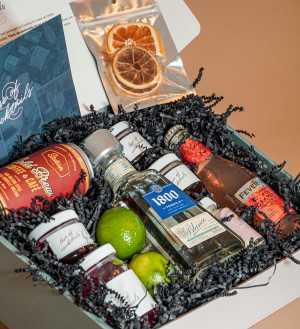
During the pandemic, Evelyn Chick launched a cocktail kit delivery service
“A lot of people are so much more interested in the craft cocktail movement,” says Chick. During the pandemic, when bars were shuttered, Torontonians turned to cocktail kits to get their fix. Chick launched Love of Cocktails, delivering thousands of kits a month so folks could make premium cocktails at home. “It was very successful,” says Chick. “It still is, which is really lovely.”
Toronto has well and truly become a cocktail city. But more than that, it’s become a discerning cocktail city with a clientele who know what they like, but are also willing to explore.
“The idea back in 2012 that mezcal would be this popular was faintly ridiculous,” says Greig. “Now tequila is almost like vodka. Everyone is drinking tequila, and loads of people also drink mezcal, which is very frequently a smoky, very big flavoured spirit. I think that’s a really great indicator of how much people’s perceptions have changed.”
David Greig, co-owner of Le Swan and Bar Vendetta and the beverage director of both spots, along with Cocktail Bar and Rhum Corner
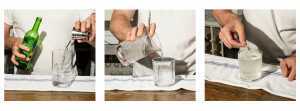
David Greig stirs up the Deep Cut at Cocktail Bar
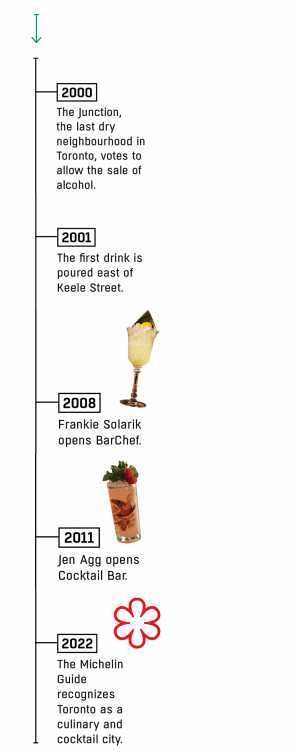
With the desire for more premium ingredients like mezcal also comes a higher price point. “You can’t just swap vodka for mezcal and keep the same prices,” says Greig. “You cannot get a bottle of mezcal in this city for less than $60 — and that’s cheap. Most mezcal is going to cost around $70 a bottle, whereas most vodkas cost $26-27. So suddenly, if you’re putting two ounces of mezcal into a drink, the cost of your cocktail goes from $2.50 to about $6.”
At Cocktail Bar, they have two delicious mezcal cocktails on the menu: A mescalero with cardamom tequila, mezcal, Aperol, grapefruit and egg white goes for $18. The Deep Cut ($19), created by bar manager Juliana Wolkowski, features mezcal, blanco tequila, yuzu sake, Fino Sherry, lychee and celery over a large ice cube — and “those things aren’t cheap either,” says Greig.
“If you want big, clear ice, you either pay for it (and it’s about $1 a cube, which you have to cost into the cocktail) or you make it yourself like we do at Cocktail Bar. With all the labour and everything involved in producing the ice cube, it costs about $0.65 to produce.”
I’ve often marvelled at those large cubes, wondering how they’re made, but I had never put much thought into the cost or labour that goes into them, let alone the other ingredients in my drink.
“On average we probably produce two to three house-made ingredients for each cocktail on the menu,” says Greig. “With 16 cocktails on the menu, we probably have around 35 to 40 house-made ingredients just for the drinks at Cocktail Bar.”
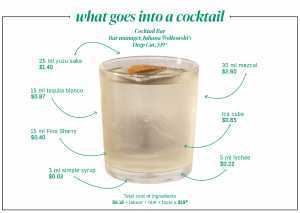
Not only do the cost of those ingredients add up, but the labour does too.
“Almost half of the hours that everyone works are actually outside of service. It’s either setting the bar up, closing the bar down, or doing the prep,” says Greig. “It used to be the case where if you worked in a bar, you’d show up, pull your bottles out of the fridge, put some ice in the well and just start making drinks … But then people started making fresh juices, and their own syrups and infusions … There’s so much more prep that goes into a cocktail menu these days than there was 10 or 15 years ago. The rise of the milk punch, which is arguably one of the most laborious drinks to make, really fits in with that as an overall trend.”
The long and arduous process of a milk punch involves clarifying a spirit mixture with milk by intentionally curdling it and then straining it. The result is a clear cocktail with a silky mouthfeel and a rounded flavour. My first clarified milk cocktail was a tequila and rose concoction at Marked restaurant that instantly won me over with its creamy mouthfeel. I can see why they’re popping up on menus all over the city, despite how challenging they are to make.
At BarChef, laborious procedures are the name of the game. Everything is made in-house, and they deal with highly perishable items. Solarik’s kitchen is run like that of a fine-dining restaurant with several different stations from expo to cryo — where the freezing happens.
“We go through about 600 pounds of dry ice a week, just specifically used for the preparation of the various ice components and presentations. You’ve got liquid nitrogen,” says Solarik. And not just anyone can handle the preparation of these ingredients. “I’ve got a team of chefs back there who are professionals … I want to make sure that they’re compensated very well for the amount of effort and passion that they put into the program.
“My goal is to make sure that my team as a whole, from bartenders to server assistants to chefs in the kitchen, are some of the highest paid in the city, just because I appreciate the amount of work and passion that goes into execution. So, the price point is based on, not only the freshest of ingredients that we’re using, but also the perishability of those ingredients, and the skill level as well,” says Solarik who now stars as a judge on Netflix’s Drink Masters, tasting creations from some of the best mixologists in North America.
Everything is made in-house for BarChef's elaborate cocktails that are often served with an intricate presentation including components like dry ice
You might not always see it when you’re watching a bartender throw some ingredients into a shaker tin, but the amount of behind-the-scenes effort and prep that goes into some of our favourite cocktails is more than we can imagine. It all shows up in the quality, flavour and texture.
Last year, the Michelin Guide came to Canada, dolling out its precious stars to restaurants in Toronto, but the cocktail scene didn’t go unnoticed.
“In terms of the process with the Michelin Guide … It is a project I and my team started with the city back in 2017, and directly with the mayor at the time,” says Franco Stalteri, who co-founded Charlie’s Burgers/CB Wine Program with Donato Carozza. “Obviously, a lot of it is shrouded in secrecy. I can’t talk too much about the process, but something that Michelin did recognize early on was that the cocktail scene in Toronto was definitely very vibrant, very progressive and very cutting edge.”
Some would say that Toronto is a world-class cocktail city, on the global stage competing with places like New York and Singapore. But for Greig, we’re not quite there yet.
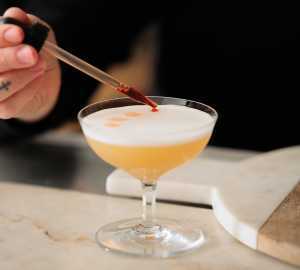
At Simpl Things, cocktails range from simple classics to colourful creations
“I think a cocktail city can really only be as good as the tools they are given. And with the massive restrictions that we have, when it comes to procuring spirits and liqueurs because of the LCBO, it’s very difficult to actually be producing world-class cocktails across the board, when the palette that we have to use is so slim,” says Greig. “It’s still really good. Let me say that. It has improved so much in 10 years. And it’s been really exciting. I’ve been very honoured to be a part of that as well.”
Once home to only a handful of places serving exceptional drinks, Toronto’s cocktail culture has grown immensely in the last decade. Now, you’ll find craft cocktails in every corner of the city and Toronto’s beverage experts competing and starring on the world stage. The amount of creativity, effort and talent that bartenders and mixologists are putting into the city’s drink scene is only rivalled by the amount of love Torontonians have for it.
